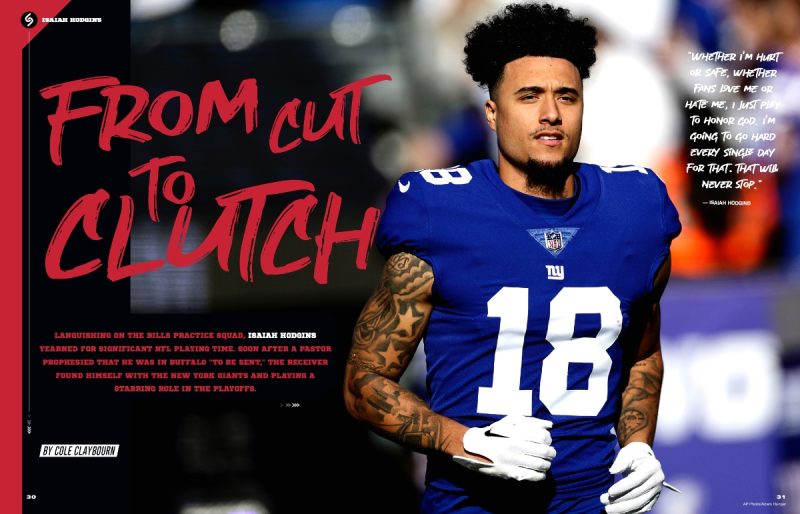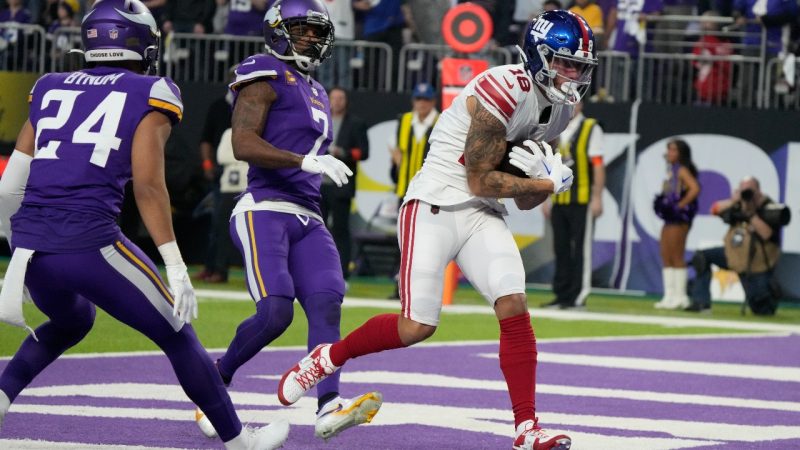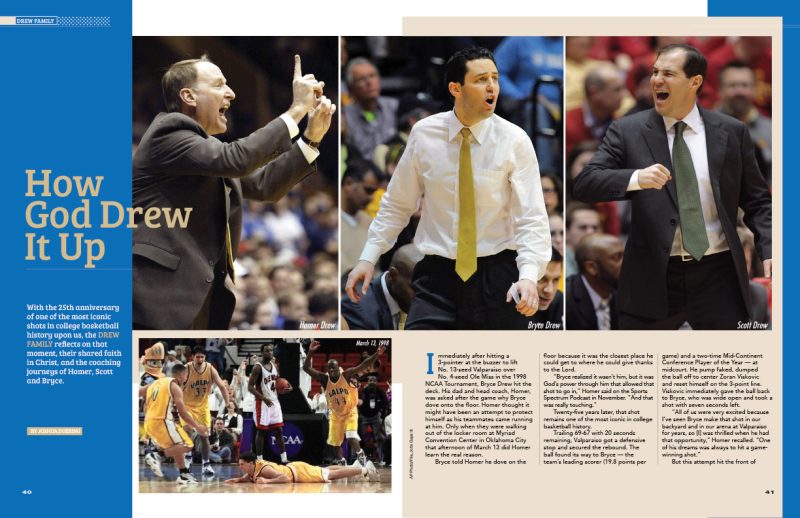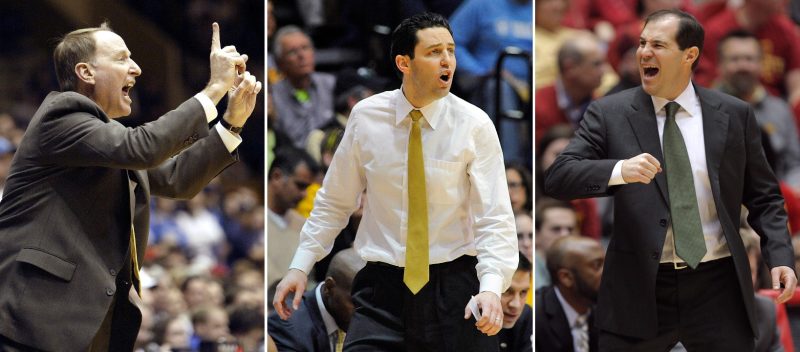That summer, John Morris would sit in church every Sunday and feel his eyes well up. His wife would look at him, concerned.
“It’s okay,” he’d say. Then she would hold his hand.
But he wasn’t okay. How could he be?
How can you be okay when a player kills—kills—another player? When the town you’ve lived in for 25 years—Waco, Texas—is a media circus, the center of one of the most catastrophic scandals in college basketball history? When the school you love—your employer for the last eight years—is like an exploding building, collapsing in slow motion for the entire nation to see?
The summer of 2003 probably feels like an eternal scar to Baylor University—an unforgiveable, unforgettable sin. It can’t be looked over. It defines them. Few stories about Baylor—even now, almost 10 years later—can be written without mentioning one of the most tragic scandals in college basketball, a scandal that included a murder, numerous NCAA violations, and one of the severest penalties in NCAA basketball history.
This is another one of those stories; and yet, it’s different. Baylor’s downfall is deeper than decisions. It’s deeper than consequences. It’s deeper than money and numbers and ethics, as the media has already widely reported.
Everything unraveled the way it did because of a void, a void that made a laughingstock of an institution and a mockery of its religion.
John Morris
If there was a “Mr. Baylor,” it’d undoubtedly be broadcaster John Morris, the “Voice of the Baylor Bears.”
Waco is Morris’ home, and Baylor, the largest Baptist University in the world, is his passion. Morris graduated from Baylor in 1980, and has lived in Waco, Texas, for the last 35 years. He worked at a Waco television station for 15 years after graduation and has been at Baylor for the last 15.
Like a marriage, his relationship with the university has survived because of his inseparable love for the institution. His passion for Baylor isn’t circumstantial, swayed by highs and lows, winning and losing. If that were the case, he would have left a long time ago.
Morris, who started working for Baylor in 1995, remembers when Dave Bliss accepted the basketball head-coaching job in 1999.
“When I heard he was interested in the Baylor job, I was like, ‘Wow, we can get Coach Bliss at Baylor?’” Morris recalls. “It was a big deal. He had a really good track record.”
Bliss’ coaching career before Baylor could be explained in his name: blissful.
He got his start as an assistant at Army and Indiana under Bob Knight where he helped recruit the 1976 Indiana Hoosier team that went undefeated, then accepted his first head-coaching job at the University of Oklahoma before coaching Southern Methodist University for eight years, where he led them to three NCAA tournament appearances and the program’s first Southwest Conference regular-season title in 21 years. After SMU, he led New Mexico to 20 or more wins in 10 of his 11 seasons, including seven NCAA tournament berths.
“He was one of the big-name coaches in college basketball,” Morris continues. “When we hired him, I thought it was a really big, good, hire. I thought it made a statement that Baylor was serious about basketball.”
Bliss was hired in 1999 to resurrect Baylor’s basketball program, a program that hadn’t been to the NCAA tournament since 1988. To alumni, fans, and the school, Bliss was the best hire they could have made. If anyone was the man for the job, he was.
The rebuilding process, however, was slower than Bliss expected, and a series of bad decisions all culminated in the summer of 2003, when everything shattered into a million pieces, like a bullet in a mirror.
It was a bullet that triggered everything—the murder of one of Bliss’ players, Patrick Dennehy, by another player, Carlton Dotson, thus making Waco, Texas, the center of the sporting world.
“More and more of the story was brought to life,” Morris says. “Pieces of the puzzle started falling into place, and it was wide-eyed shock that actually went on at Baylor and in Waco…Patrick was a part of the family, and our hearts just broke when that happened.”
After the murder on June 8 and the sentencing of Dotson on June 15, it was discovered in August that Bliss paid the tuitions of Dennehy and another player, Corey Herring, a blatant NCAA violation. An investigation ensued, and Bliss took extreme measures to hide and lie about his improprieties.
“It was just a summer of a dark cloud hanging over Baylor,” Morris says. “(Going to work), it was almost like, ‘Well, what’s going to happen today? What’s the story that will come out today?’ That’s a bad way to go to work. That’s not a good feeling at all.”
It was also revealed in August there were recruiting violations and widespread drug abuse on the team, ignored by Bliss and his staff. Bliss would soon resign, damning his legacy and the reputation of the school.
“It’s just sad, really sad for our school,” Morris continues. “We have so many good people there and so many good coaches. Baylor stands for something. Baylor is a faith-based university, and we are proud of that fact, and to have something like this happen, you know what’s coming. You are going to get a lot of arrows slung at you—why something like this happened at Baylor in comparison to another school that doesn’t profess to be a Christian university. It was just really sad for Baylor.”
Dave Bliss
If the story stopped there, Dave Bliss is a heartless fool, Baylor basketball is a scandalous joke, and the principles Baylor advertises are a mere façade and devious hoax, like a pastor who has an affair, a priest who molests a child, or an usher who steals from the collection plate. If the story stopped there, Bliss is a fraud, and so is Baylor. Forget the fact Baylor is a Christian institution; what transpired in Waco was bad for any institution.
But you can say what you want about Bliss, and you can say what you want about Baylor, and you can say what you want about religion. You can judgmentally scowl at Bliss and Baylor’s perceived hypocrisy, probably blinded by your own, or you can see the beauty of redemption, the beauty of someone like Peter (a follower of Jesus, by the way) denying Jesus three times, then willingly getting crucified upside down for the cause of Christianity. There’s beauty in transformation.
“I think I felt just as Peter did when he denied Christ,” says Bliss, who, in a rare interview, transparently spoke to Sports Spectrum for more than an hour. “My actions were sour and they were arrogant and they denied Christ, and I felt badly about that.”
Bliss, somewhat ironically, accepted the position at Baylor in 1999 because of what the institution stood for, because of its Christian values.
“I chose to go to Baylor because I wanted to end my career coaching at a Christian school, and God created the largest Baptist institution in the world for me,” Bliss says. “When I went to Baylor, for whatever reason, I got off-centered.”
While the Baylor scandal itself unraveled rather suddenly—all in the treacherous summer of 2003—the void that formed in Bliss’ heart was gradual, like termites in a cabin, eventually causing its collapse.
“Charles Stanley talks about four aspects that cause you to sin: hunger, anger, loneliness and tiredness,” Bliss says retrospectively. “The thing I really had a problem with was that I wanted it to be a good program so I was working harder than I ever worked. That got me away from my quiet time; it got me away from church. You would think that being at Baylor I would be closer. But that’s not how the devil works. All of a sudden, I started making a couple of decisions.”
Bliss was tired—tired of putting in the hours, the effort, and getting no results. He wanted to win. He wanted to transform Baylor like he transformed Southern Methodist. He wanted to fix it. He wanted results. He was exhausted.
“I don’t know if you know how I ended up paying the scholarships—I don’t know if that’s ever been told,” Bliss says. “The summer of 2002, I had three people who were going to summer school, and I was afraid they weren’t going to make it so I recruited some other guys as backups…Long story short, they made it, and now I had too many players. I kept the two I recruited in their place: Herring and Dennehy…Baylor cost so much as a private school, at the end of the year, they had an amount due, and I was backed into a corner, and that’s when the integrity issue hit. I went and paid it myself because I knew it was wrong to ask someone else to help me. When you throw the murder in there, and it’s uncovered, and it’s played out, it just kept getting worse and worse. It’s really a shock when you are on ESPN and it’s not good…
“You have to mature. And I wasn’t mature. I made decisions that were poor ones based on my immaturity and my humanness because I was arrogantly trying to elevate myself. I was trying to help my program and I just didn’t trust God. If I had trusted God and been patient, everything would have worked out…I just made some terrible decisions, and I attribute that to the fact that I was tired and so immersed in trying to have a good program.”
The weird thing about sin is that it’s usually the result of selfishness, yet in the process of satisfying yourself, you wound others in ways you never imagined. There’s really no denying it: Bliss wounded a lot of people at Baylor. And the fallout was catastrophic, the worst the college basketball world had ever seen.
“I hurt a school I cared a great deal about,” Bliss says. “I violated my wife’s trust. I love my wife, and she has been a great partner through all this. But the aspect of impugning my faith, that was my lowest moment. Separation from God is real when you sin.”
Bliss resigned from Baylor and entered the darkest five-year period of his life, entangled in his sin and guilt, dying inside.
“I didn’t go in to ax-murder the Baylor program,” Bliss says. “I went in and just got off track.”
Scott Drew
Scott Drew was more like disaster relief when he accepted the Baylor head-coaching position the summer of 2003, hired to clean up the remains of a shattered program from a scandal that hit like a hurricane—and then somehow rebuild it.
After successfully leading Valparaiso to a regular season conference championship in his first year as head coach the year before, taking his father Homer Drew’s place, you could say Scott was borderline insane for moving his family to Waco, Texas, into the eye of a disaster—and to do it with such enthusiasm, an incomprehensible zeal that, according to Morris, very well may have been the rallying cry that made Baylor Nation believe again.
“Any major decision, or any decision, you bring it to prayer and seek godly council,” Drew says of his decision to move to Waco. “I just felt really led to come here, and felt like it was where God wanted me, and haven’t felt Him moving me anywhere else,” he laughs cheerfully.
But it was going to be a long, long road, especially coming from a stable Valparaiso program that reached the NCAA tournament six out of the previous seven years.
Drew and his staff spent the first several weeks recruiting on campus—on campus—and holding open tryouts to find, not only players, but starters—starters. This is a Big 12 program, remember, not a small-town high school, where coaches may try to fill their roster spots with non-athletes just so they can field a team.
“We were recruiting on campus the first couple of weeks!” Drew laughs.
He remembers their first open tryout, when an ungodly amount of students showed up, many of which he didn’t recognize on his “recruiting visits,” if that’s what you call them, to the Baylor Student Life Center. He was confused. Who were all these kids?
“We asked them, ‘What year are you in school? What is your major?’” Drew tells the story. “Turns out, we found that a lot of these people just showed up from junior colleges (in the area) and didn’t think they had to be enrolled at Baylor,” he laughs again. “The early days, when you are in the Big 12, it’s hard to have walk-ons going up against McDonald’s All-Americans.”
He can laugh at it now. And heck, he may have laughed then, too.
Baylor basketball, after all, was nothing more than a joke.
Redemption
You probably already know the redemption story of Baylor basketball—how, after recruiting at the Baylor Student Life Center the opening months, missing non-conference play their 2005-06 season (the first time the NCAA has imposed a half-season penalty), and racking up four straight losing seasons, they made the NCAA tournament in 2008 for the first time in 20 years. Or how they have advanced to the Elite Eight two out of the last three years. Or how they recently upset No. 8 Kentucky. What Drew has done with Baylor from a winning perspective is unbelievable—ridiculous, really—but it’s deeper than that.
“I’m very pleased Baylor is doing well,” Bliss says. “I consider Scott (Drew) a very professional coach and good coach.”
Just as Baylor and Bliss fell together, they also rose together. With Baylor, with Bliss, it was a heart issue.
“Absolutely, (there was a spiritual void),” Bliss says. “I came there with my ducks in line.”
And that’s the story you haven’t heard. Both Baylor and Bliss were missing something—something deep.
“I’m not casting aspersion on anyone else, but it really was (a different culture then),” Morris says, referring to Baylor before Drew. “Coach Drew is so bold in his faith and the way he works it in everything he does with his team. It was a major change. It really was…I’ve never been around a coach and a coaching staff like Coach Drew and his staff who have God first in everything they do and every decision they make. The chapel he has with the team before every game—and it’s not just a chapel—it’s the atmosphere around that program. It’s really special. You appreciate that when you see how he is investing in those guys’ lives. It’s what we should do at Baylor. “
Both Baylor and Bliss took five years to recover, five years for Drew to get the program back on the winning trail and bury the past, and five years for Bliss to bury his.
“When judged on a worldly view of things you look at it when you aren’t winning games, and it’s hard to find much satisfaction and appreciation for what you are doing,” Drew says. “But the first couple years we had a lot of people come to know Christ—managers and players—and relationships strengthened. Those successes were all more important than wins and losses…We always focused on the positives and the future, and we didn’t have a lot of days where we sat around and questioned things.”
“I think about this every day—what I did,” says Bliss, who is now the athletic director at Allen Academy, a small, private high school in Bryan, Texas. “For five years I really tried to go around and tell everybody what a good guy I was. That’s what you do when you can’t forgive yourself. You try to change everybody’s mind about you. For five years, I was definitely in the wilderness. It’s the most arrogant thought you can possibly have is that you can’t forgive yourself. The two biggest things I needed were God’s forgiveness and His grace in my life.”
Both Baylor and Bliss got back to the heart, the core of their existence. Drew’s slogan for the basketball program is “For His Glory.”
“That’s something we pride ourselves on is the relationships we have with our players,” Drew says. “No cussing policy in practice. Begin practice with a prayer. End practice with a prayer. Chapel service the day of the game. Pray with opponents at half-court at the end of the game if they want to. Everything is Christ-based.”
“I got back to the basics of reading my Bible,” Bliss says. “I would get up early and read my Bible and keep journals. I’ve kept seven journals. I would see aspects of Nebuchadnezzar and aspects of King David. If you don’t think there is a book about the fallenness of man, the Bible is full of it…I had done what I had done, and I accepted the consequences, but that’s not where my relationship with God was going to end.”
There’s an obscure book in the Bible called Lamentations. The book is a reminder that titles don’t matter. Just because the Israelites are “God’s chosen people,” Jerusalem is God’s “Holy City,” and Baylor is a “faith-based institution,” doesn’t mean they can’t fall. It’s all about the heart. If it were about the title, then the godless Babylonians wouldn’t have set Jerusalem aflame, and Baylor wouldn’t have made a laughingstock of its values. Why? Because if it were about the title, then anything associated with God should never make God look stupid. But it’s deeper than that, deeper than a measly title, cheap façade or marketing ploy.
Perhaps it’s a tragic tale. Perhaps. But the story doesn’t end the summer of 2003. And it doesn’t end the winter of 2012. The heart is as ongoing as its beating, a continuous tale of its pursuit. And just as it beats with life or stops at death, it either pursues or does not.
“Second chances don’t come without repentance,” Bliss says. “I know I am the poster child for second chances. I don’t ask people to forgive me…But we need to slow down as people and get into our priorities, and the greatest priority is to understand your relationship with God.”
The story of Baylor and Bliss and vices and voids is a complicated, messy account that poses a profound, simple question about the heart of every man.
Is it beating?
By Stephen Copeland
Stephen Copeland is a staff writer and columnist at Sports Spectrum magazine.





